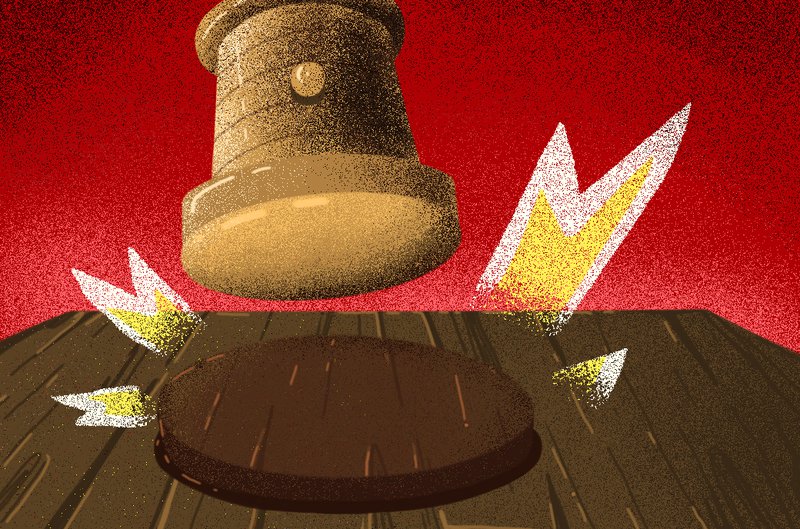2019-7-16 00:44 |
Banks are like a bad ex: just when you thought you were getting over them, they find a new way to get back in your life and screw you again. In the latest unhappy rebound, news emerged last week that JPMorgan Chase is thanking 47 million customers by scrapping their rights to sue.
Currently, customers with Chase credit cards can take the bank to court over disputes. However, under the new rules, they’ll have to undergo a binding arbitration process first. Customers have only a month to opt out of the change, which will otherwise be applied automatically.
It may not seem like a big deal, but the new clause makes the bank effectively impervious to legal action. Unlike courtroom trials, there are no class-action arbitrations, meaning customers can only pursue grievances individually.
That means the playing field is tilted even more in the banks’ favor. While court cases against banks end up with an average settlement of just $32, the chances of winning anything in arbitration are a paltry nine percent.
Such clauses were forbidden until 2017, when the U.S. Senate repealed a rule against mandatory arbitration clauses in credit card agreements. Apparently, that particular curtailment of citizens’ rights wasn’t important enough for a mention on the Presidential Twitter feed.
This is just the latest step in a long march by profit-driven finance giants to squeeze out more value from their customers. And JPMorgan isn’t alone. Here are a few other examples in recent years:
Mis-sellingIn the UK, payment protection insurance (PPI) became a dirty word back in 2011 when courts determined that the banks had been mis-selling it for years. PPI supposedly exists to cover loan or credit card payments in the event that you get sick or laid off.
However, the premiums added around 50% to the value of each loan, with the banks paying out only around 15% of what they were making. The Citizens Advice Bureau, a consumer protection body, labeled it a “protection racket.” The practice was eventually outlawed, allowing millions of customers to claim refunds.
Wells Fargo has been caught engaging in similar practices with U.S. customers.
Re-ordering Payments to Charge Extortionate FeesIf you spend more money than you have, you know you’re going to get whacked with overdraft fees. But you might not expect your bank to re-order your payments, to make sure you pay again and again.
That’s what happened to customers at Bank of America, Wells Fargo, and many other financial institutions, which were caught “re-sequencing” transactions to maximize overdraft fees. So, if you have $50 in your account and spend $3 on coffee, $10 on groceries and $48 on your phone bill, the banks would re-order your transactions for triple the payoff.
A loan shark couldn’t do a better job.
Plain Old TheftBetween 1993 and 2003, Bank of America helped itself to the social security checks of its customers, amounting to over $280 million. Elderly and disabled people who rely on state welfare existed week to week without any money for food, household bills or other luxuries, because the Bank had claimed their money for unpaid fees. Eventually, a California judge awarded damages in excess of $1 billion to affected customers.
Guess how they managed to state their case? Because they were allowed to collectively sue the bank in a court of law and not forced into arbitration.
There are dozens of other examples of banks behaving badly. Swiss bank UBS has been found guilty of tax avoidance. Amid the recent news of sweeping job cuts, executives at Deutschebank had a tailor visit their offices to measure them up for $1800 suits. Bank of America (again) propped up Ponzi schemes. In Europe, even the regulators turned a blind eye to evidence of Russian money-laundering by the big banks.
And don’t get us started on the 2008 financial crisis.
What Can We Do About It?For most of us, a bank account is a necessity rather than a luxury. Although it’s challenging to avoid having a bank account completely, there are some ways we can reduce our dependence on the big banks, without turning to the Libra currency.
Of course, cryptocurrencies like bitcoin offer one way to keep your funds out of the banks. Stablecoins can help you avoid volatility, while decentralized finance can replace some banking functions.
However, there are still two big barriers to overcome: most employers don’t pay in crypto, and many merchants don’t accept it.
The good news is, the banking industry is undergoing something of a digital revolution right now. “Challenger banks” are fintech startups which offer the same services as banks but with more convenience and often more transparency.
Which one to use will depend on your location. Chime and Varo both service US customers, Monzo is available for the UK, and Revolut is opening up in more countries globally. Transferwise is also widely available these days, allowing cheaper forex transactions.
Another alternative is credit unions – non-profit organizations which generally offer better rates on savings and loans than banks. The drawback is that they tend to be very localized.
Hit Them Where It HurtsThe only way to show the big banks that we care about our money is take it elsewhere. Governments are reluctant to rein in big finance, so it falls to consumers to watch out for their rights.
But if you’re a Chase customer and you want to retain your right to sue in a court of law, then drop them an old-school pen-and-paper letter telling them that you “reject this agreement to arbitrate.” Your notice needs to be mailed to Chase before August 7th, at P.O. Box 15298, Wilmington, DE 19850-5298.
The post Binding Arbitration: JPMorgan Discovers A New Way To Screw Customers appeared first on Crypto Briefing.
origin »Bitcoin price in Telegram @btc_price_every_hour
Time New Bank (TNB) íà Currencies.ru
|
|

























